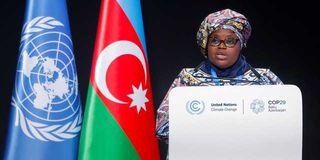Climate finance or investments? Why poor countries want money with no strings attached

Gambia's Minister of Environment, Climate Change and Natural Resources Rohey John delivers a statement during the United Nations climate change conference COP29, in Baku, Azerbaijan November 19, 2024.
In Baku, Azerbaijan
With just three days remaining until the close of COP29, the annual climate talks have reached a tipping point, exposing the deep divisions between developed and developing nations on climate finance.
Delegates are clinging to hope. Yet, frustration is palpable—echoing in official sessions and the whispered laments filling the hallways.
The mood, described by one observer as “a quiet storm”, boiled over when the Executive Secretary of the United Nations Framework Convention for Climate Change Secretariat, Simon Stiell, publicly called on ministers to “cut the theatrics” and get serious about finding common ground.
“Bluffing, brinkmanship and pre-mediated playbooks burn up precious time and run down the goodwill needed for an ambitious package,” Stiell remarked. “We can’t lose sight of the forest because we’re tussling over individual trees. Nor can we afford an outbreak of ‘you-first-ism’, where groups of parties dig in and refuse to move on one issue until others move elsewhere.”
Against mounting global tensions over climate finance, African ministers have voiced their strong opposition to private sector-led solutions and diluted financial commitments from developed nations.
“We have seen the Organisation for Economic Co-operation and Development report that says that in 2022, the target of 100 billion US dollars was achieved a little above. More than 60 per cent of this went into loans to African countries, to the least developed countries, contributing the least to the climate crisis.
“We have to communicate loudly and clearly, and it cannot be only in place, but also in a practical decision that will guide our actions for tomorrow. That’s what we call business as usual. It is not working, so we need to change the business as usual,” said Rohey John, Minister of Environment, Climate Change and Natural Resources in The Gambia.
Climate crisis
She and her counterparts argue that the climate crisis cannot be addressed through mechanisms that place an undue burden on the developing world, which bears the brunt of climate change despite contributing the least to global emissions.
This year’s COP coincides with discussions at the G20 leaders meeting in Rio de Janeiro, Brazil. To move the needle towards an agreement on climate finance, all eyes were at one point on the leaders in Rio to send a signal that could help end the impasse.
While they agreed that the developed and developing countries should reach a deal on the New Quantified Collective Goal, they did not indicate what the final outlook will be like come Friday when the over 60, 000 delegates from 200 countries leave Baku.
Speaking at a press conference on the sidelines of COP29, a representative from Angola said:
“These meetings are expensive to have and to attend. They cost our countries a lot of money. As African countries, we are here in good faith. We expect the same from developed countries. Good faith means they should deliver on their promises for a just finance deal.”
One of the most contentious issues at COP29 is the introduction of a Global Investment Goal proposed by developed nations. This concept seeks to redefine climate finance by including domestic climate-related investments in both developed and developing countries as part of the overall financial tally.
Fatuma Hussein, Africa’s lead negotiator on just transition, explained the problem with this approach: “Under this framework, if Kenya invests in renewable energy or climate-smart agriculture, it would count as part of the global climate finance tally. Similarly, if the UK invests in solar energy for its energy transition, that too would be included.”
The shift, she argued, fundamentally alters the architecture of climate finance. “It’s no longer about the Global North providing resources to the Global South to address the climate crisis. It’s about everyone being accountable for what they do within their borders. This is a complete dilution of what climate finance is meant to achieve, and Africa cannot support it.”
Balarabe Abbas Lawal, Environment Minister of Nigeria, pointed out the glaring inequities in the current climate finance system, adding that the “finance issue is becoming a mirage—the more we talk about it the more it disappears”.
Another sticking point in the negotiations has been the mechanism of climate finance delivery. African ministers have strongly opposed loans being passed off as climate finance, arguing that they impose an additional financial burden. This tension has stalled negotiations, with ministers warning that the conference risks becoming another “talking shop”.




